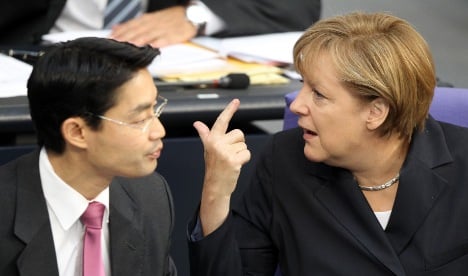After taking less than two percent of the vote, the Free Democratic Party (FDP) has been turfed out of the German capital’s state legislature. The miserable result caps a dismal year for the party, which suffered losses in seven separate elections.
Merkel’s conservatives are now trying to calculate the damage the Berlin election may do to their centre-right alliance at the national level with the pro-business party – particularly after the FDP’s recent flirtation with euroscepticism while Europe’s sovereign debt crisis continues to simmer.
On Sunday FDP leader and Economy Minister Philipp Rösler said he would continue to speak out on the subject of the eurozone, even if it didn’t mirror the government line.
A week before the Berlin election, Rösler had played the populist card and raised the hackles of Merkel and her supporters by ignoring her call for quiet on the subject of a potential Greek default – and opposing moves towards a further bailout.
Yet as the conservative Frankfurter Allgemeine Zeitung wrote in a commentary on Monday, “Everyone has been having the supposedly verboten thoughts. A Greek default has been considered for weeks and months – an orderly or disorderly bankruptcy, debt reduction and haircut, exit from or remaining within the eurozone. It is also talked about – in parliamentary debates, in party conferences, talk shows and in the pubs.”
The Finance Ministry is also working through various scenarios in the attempt to find one which could enable some form of default without a chain reaction, the paper said.
“That the rescues will have to end at some point is thus in no way taboo – it is just not yet government policy. And that is an important difference.”
As the financial daily Handelsblatt surmised, “The new, clear failure of the FDP and the humble result for the CDU will be a further weakening of Merkel’s coalition on the federal level. The Liberals and their young party leadership will be under further pressure. And with that, the fight over the euro-critical course of the FDP could increase in severity, while in turn will further burden the ruling coalition of the chancellor.”
And while Rösler has secured the support of most of his party with what the centre-left Süddeutsche Zeitung daily described on Monday as a, “self-confident and confrontational tone,” there is at least one FDP voice of criticism. Cornelia Pieper, a member of the party’s executive body, and deputy to former leader Guido Westerwelle in the Foreign Ministry, said the election result had illustrated mistakes.
“I believe it was a mistake to take the Europe Party, the FDP, in the direction of euro-scepticism,” she told the regional daily Mitteldeutsche Zeitung. “That is and remains implausible. That is what the election analysis shows.”
The reawakening of a possible national coalition Social Democrats and Greens by what is now regarded as the most likely combination in Berlin cannot be sustained on the city’s election results alone, said the left-leaning Frankfurter Rundschau.
“If Red and Green want to govern nationally, at the latest from 2013… they must, and immediately, provide smarter answers than (Merkel’s centre-right coalition), which will now try to try with everything they have to turn the page – albeit with demagogic rampages like the anti-euro campaign of the FDP, which happily did not take (yet?) with this election.”
The left-wing Berliner Zeitung said simply, “This coalition was a slow-burning nightmare. Now in its last spasms, the intellectually bankrupt FDP could be a threat. We don’t want to ashamed any longer. The (FDP) can unravel its bankruptcy in intimate circles. Perhaps it will reinvent itself as a pyromaniac, populist party of anti-Europeans, entering the business of whipped-up emotions. A late bit of Haider, with a bit of Wilders, a slurp of the Tea Party?
“What is fatal: This troop, although it feels like they’ve been in office forever, still has two full years there. ‘We have the voters’ mandate for this legislature period,’ they shout. We hear that with horror.”




 Please whitelist us to continue reading.
Please whitelist us to continue reading.
Member comments